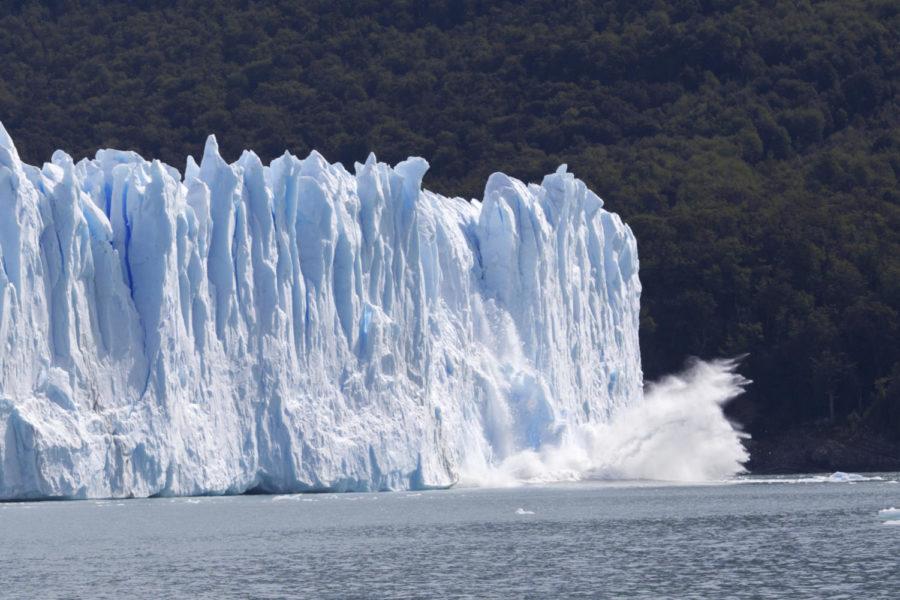Titus: Climate change needs direct attention
Climate change directly impacts the speed of which the polar ice caps are melting. Two scientists recently filmed the largest ice calving in history in Greenland, when an ice shelf roughly the size of Manhattan calved in 75 minutes. Ice melting will affect the amount that the sea level rises, and even if people act now, it will take years to get back to a state when humans have no negative effects on the environment.
October 13, 2014
Every single species in the world is endangered. The planet is changing, and humans are, without a doubt, a part of the reason why. Climate change is a serious situation, and it should command more attention. There has been too much debate about who is causing climate change when what really needs to be discussed are solutions to fix the problem.
Climates all over the world are changing. Areas of Africa suffer from drought while areas on coastlines are flooding from tidal waves and typhoons. There are areas across the planet facing extreme weather events like tornadoes and hurricanes due to intense temperatures with the changing of seasons. Of course, while all of this is happening, the most obvious sign of climate change is the melting of polar ice caps, which is the first thing that comes to mind when thinking about climate change.
A video posted by a team of scientists showed that the Greenland ice sheet is melting at a faster rate than ever before. An ice sheet the size of Manhattan calved in only 75 minutes, the largest ice calving ever recorded. While it can be determined that smaller shifts in the ice happen fairly often, evidence shows that from 1900 to 2000 the ice only retreated eight miles, whereas the ice has retreated nine miles in the last 10 years alone.
Ice is melting at the fastest rates ever recorded, yet so many people still believe that global warming, also known as climate change, is not happening, or that it is not caused by people. It is true that the planet is constantly evolving, and patterns show that there are natural heating and coolings of the planet over time. However, the rate at which the planet is heating is at an all-time high, and temperatures are rising all over the globe.
We are experiencing climate change right here in Iowa. During the winter of 2013-2014, Iowa experienced a season that, during some of our coldest weeks, were colder than the temperatures recorded in Alaska. At the same time, our summer temperatures seem to get hotter and hotter every year. Our ozone layer is thinner than ever before due to the burning of fossil fuels and the buildup of greenhouse gasses.
With the continuation of glacial ice melting, the sea level could potentially rise 18 to nearly 60 centimeters by the end of the century, according to a National Geographic video. While this number seems pretty low, over long periods of time this could eventually mean the wiping out of cities on coastlines all over the world. That is 44 percent of the world’s population and hundreds of millions of people.
As the climate changes and regions start having radical climate unknown to the specific area, biodiversity is affected. Over time, species of animals could evolve to live in a changed environment. But, with the speedy rate at which the environment is evolving, it is nearly impossible for a species to keep up.
One of the most well-known cases of biodiversity being directly affected by climate change is the case of polar bears. For polar bears, ice caps are a natural habitat and source of hunting. Due to climate change, polar ice caps drift further and further apart, causing the bears to have to swim longer distances and even drown in an attempt to get to their food source. Polar bears have become an endangered species and will probably go extinct soon if something does not change.
Greenhouse gases, carbon dioxide emissions and deforestation are three of the leading causes of the human-caused climate change. People are the leading cause of climate change. At the rate we are going, even if we were to work to fix the problem of climate change right now, it would still take years for the effects to show.
Of course there is the argument that there is going to be a natural shift in Earth’s climate with or without humans, but the planet naturally has the capability of creating a balance between natural heating and natural cooling. While carbon dioxide emissions continue to increase, the probability of Earth to naturally cool becomes more and more difficult. We need to start working immediately to try to save our planet.
When thinking about climate change, it is time to start thinking about the bigger picture. People, animals and the environment are all affected by climate change. We must learn to think for the future. If we want to start saving the polar bears or for our children and grandchildren to live on a sustainable planet, we have to act fast.
We must work together as a planet to reduce the amount of fossil fuels burned, as well as the amounts of carbon dioxide emissions that are released into the air. It is a big job, but every person counts. It is too easy to say that we are not going to make a difference and continue down the same track we have been following for years. We need to stand up, take initiative and start making changes in our daily lives, and hopefully, if enough of us can do it, that will start making changes to planet Earth.







